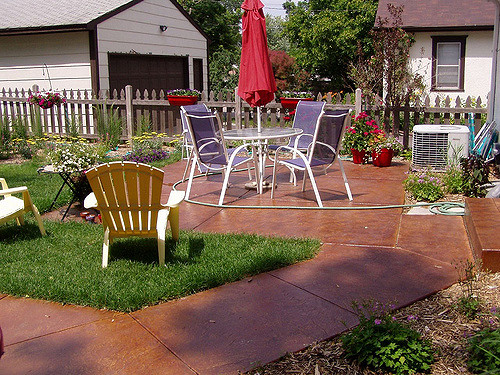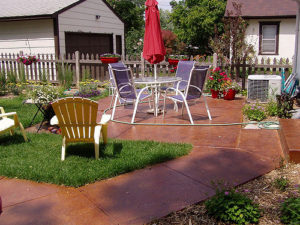
 As the weather continues to warm, you’ll probably find yourself spending more time outside. A properly designed patio with comfortable seating and a fire pit is the perfect area to enjoy the warm and sunny summer weather — but only if it’s free of pests. Unfortunately, pests are a common occurrence on patios. From mosquitoes to termites and bees, these pests can wreak havoc by inflecting pain or causing structural damage. Here are a few of the most common patio pests and how to prevent them.
As the weather continues to warm, you’ll probably find yourself spending more time outside. A properly designed patio with comfortable seating and a fire pit is the perfect area to enjoy the warm and sunny summer weather — but only if it’s free of pests. Unfortunately, pests are a common occurrence on patios. From mosquitoes to termites and bees, these pests can wreak havoc by inflecting pain or causing structural damage. Here are a few of the most common patio pests and how to prevent them.
Mosquitoes
It’s difficult to enjoy your patio when you’re being constantly bombarded by blood-sucking mosquitoes. Normally, mosquitoes are only problem if there’s standing water on or near your patio. Female mosquitoes lay about 100 eggs in water every third night after they mate. By eliminating areas of standing water around your home, you’ll discourage mosquitoes from reproducing and create a more harmonious outdoor living space.
Adding the following plants to the landscape surrounding your patio may also help to deter mosquitoes:
- Lavender
- Chrysanthemum
- Lamongrass
- Basil
- Thyme
- Marigold
- Rosemary
- Mint
Fleas
If you own a cat, dog or both, you may notice fleas on your patio. Research shows that a single female flea can produce 600 eggs per month. Like mosquitoes, fleas feast on blood, though they generally prefer the blood of small animals rather than humans. Therefore, eliminating them from your patio requires treating your pets. Talk to your veterinarian about a flea treatment regimen for your cat or dog. He or she should be able to recommend an effective flea prevention and treatment product, such as Fipronil. Additionally, applying a layer of cedar mulch across your lawn can deter fleas and other common pests. Cedar contains a combination of unique oils that, for whenever reason, fleas hate. By adding it to your lawn, you’ll discourage fleas from taking refuge.
Carpenter Ants
Carpenter ants (Camponotus spp.) aren’t your typical fire ants. While fire ants are bad enough, carpenter ants are particularly concerning because of their ability to destroy wood. They don’t necessary consume it for nutrition but, instead, for building nests. Using their long mandibles, carpenter ants can chew through a wooden patio, leaving behind holes and tunnels. Over time, the presence of these holes can create an unsafe environment for you and your family.,
Termites
If your patio is constructed of wood, you should inspect it for signs of termite damage on a regular basis. These wood-boring pests cause billions of dollars in property damage to houses each year in the United States. The most effective way to prevent termites on a patio is to use pressure-treated lumber. As you may know, pressure-treated lumber is sprayed and treated with chemicals to protect it from pests, rot and decay. You can expect to pay more pressure-treated lumber than non-pressure-treated lumber, but it’s a smart long-term investment because of the increased protection that it offers.
The Environmental Protection Agency (EPA) also offers some helpful tips to protect against termites, some of which include filling cracks in the foundation, storing firewood off the ground (don’t store it directly on your patio), finding and fixing water leaks and ensuring your lawn has proper drainage. And if you discover termite damage on your patio, have it repaired as soon as possible to mitigate the damage.
Yellow Jackets
 Normally, bees and wasps will keep their distance from humans unless provoked, but there’s one common exception: the yellow jacket. Classified as a wasp, these aggressive pests may seek out and sting nearby people unprovoked. It’s important to note that yellow jackets feed on protein, so keeping them off your patio requires removal of protein sources. If you grill burgers or cook other food on your patio, be sure to bring it indoors when you are finished. Leaving protein sources on your patio will only attract yellow jackets and other pests.
Normally, bees and wasps will keep their distance from humans unless provoked, but there’s one common exception: the yellow jacket. Classified as a wasp, these aggressive pests may seek out and sting nearby people unprovoked. It’s important to note that yellow jackets feed on protein, so keeping them off your patio requires removal of protein sources. If you grill burgers or cook other food on your patio, be sure to bring it indoors when you are finished. Leaving protein sources on your patio will only attract yellow jackets and other pests.
Yellow jackets are also attracted sugar. Whether it’s a watermelon rind, cup of sweet tea or plate of leftover dessert, you should avoid leaving sugary foods or beverages on your patio.
Flies
And then there are flies. The good news about flies is that most species have an average lifespan of just one month. The bad news, however, is during that time a fly can lay up to 500 eggs, so you need to take action to keep them off your patio. A simple solution to keep flies, mosquitoes and other flying pests away from your patio is to build a fire. The smoke from a fire is a natural insect repellent and will deter most flying pests. You can also keep flies away from your patio by using a fan. Assuming your patio has an overhead fan built in, turning it on will literally blow away the flies so that they can take over patio.
If you have any questions regarding how an S&S Fire Pit can enhance your outdoor living space; We can help. https://ssfirepits.com/contact/


